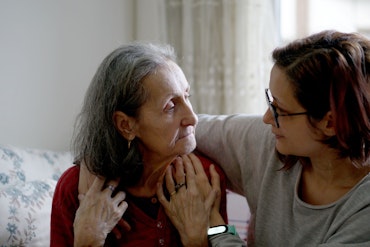Elderly suicide: an under-reported tragedy
TRIGGER WARNING: The following article contains themes of depression and suicide. Three Australians aged 75 and older take their own lives every week, according to Australian Bureau of Statistics (ABS) data.

Elderly suicide is reportedly an 'under-reported' tragedy
If the base age is reduced to 70 years, then the number is closer to four per week. Both the ABS and coroners say the figures are under-reported.
“The real tragedy is that elderly people who wish to end their suffering – both physical and existential – can’t even discuss their intentions with their doctor because the doctor will likely try to dissuade them as he or she cannot ‘help’ them,” says Dr Rodney Syme, vice-president of Dying with Dignity Victoria.
Examples are common of terminally ill people scheming to be alone to suicide without interference. Fear of loved ones being implicated in unlawful acts also leads to planning to suicide secretly without consultation or goodbyes.
Without information or access to appropriate drugs they, according to Dr Syme, invariably “suicide violently” and alone, aggravating the trauma experienced by loved ones.
In the 10 years to 2004, almost 1,500 Australians aged 75 years and older killed themselves, mostly by hanging.
The next most common method was firearms, then gas, poison, drowning, and jumping from buildings. Less violent, yet equally traumatic, methods to suicide like refusing food and fluid have long been used.
The law in Australia allows a person opting to die this way to be lawfully assisted by being kept in a coma until death.
A recent court decision in Western Australia confirmed that a competent adult can choose to suicide by refusing nourishment.
“This case highlights just how obnoxious the current law is,” says Marshall Perron, former Northern Territory chief minister.
“A doctor can lawfully assist a patient endure the process of dying slowly over two weeks yet they cannot lawfully assist them die in minutes by prescribing appropriate drugs.”
He adds that a result of being denied assistance is that many of these deaths are unnecessarily premature, lonely and violent.
“Premature because the individual has to act while they have the physical and mental capacity. Lonely because the individual is aware that assisting a suicide is an offence and they do not want to implicate family or friends. Violent because they must use whatever means to die they can access.”
Mr Perron says there is a high level of interest in learning how to die peacefully and importing illegal substances to achieve that aim.
Australia's rapidly ageing population means the numbers of such suicides can be expected to increase, Dr Syme says.
“The tragedy is not that these people take their own lives; it is how they are compelled to do it in the absence of compassionate legislation permitting medical advice and assistance,” he says.
With more than 80% of the adult population supporting voluntary euthanasia, it is not surprising the subject is openly discussed in coffee shops and around backyard BBQs.
Yet, it is politicians who should be discussing it.
“My observation is that with rare exception, politicians avoid the issue whenever they can,” Mr Perron says.
“Anxious to avoid antagonising a religious minority in their electorate the easy thing to do is nothing. They try to ignore the subject in the hope it will go away.
“The community is not asking politicians to lead on this issue, they are asking them to catch up.
“Apart from religious fundamentalists, politicians are the only group who cannot seem to grasp the shift in community attitudes brought on by a rejection of pointless protracted suffering when death is inevitable.”
If you need help, phone Lifeline on 13 11 14 or Beyond Blue on 1300 224 636.























